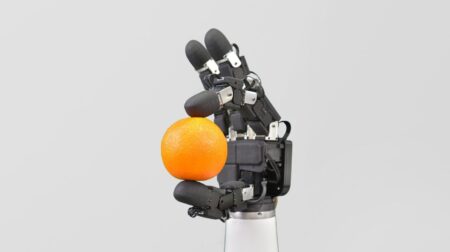Engineers at the Massachusetts Institute of Technology (MIT) have developed a robotic mobility aid designed to assist older adults with everyday tasks and help prevent falls – one of the leading causes of injury among people aged 65 and over.
The Elderly Bodily Assistance Robot (E-BAR) is a mobile device that follows a user from behind, offering physical support as needed.
Designed to aid with sit-to-stand transitions, balance and motion, the system uses a pair of robotic handlebars that users can lean on, along with embedded airbags to cushion potential falls.
The robot comprises a 100kg (220lb) omnidirectional wheeled base, an articulated lift mechanism made of 18 linked bars, and a U-shaped pair of handlebars.
These handlebars can support a person’s full weight and are designed to move with them naturally.
Each arm features inflatable airbags made from soft, grippable material that deploy rapidly in the event of a fall, offering protection without the need for a wearable harness.
The MIT team tested E-BAR with an older adult volunteer in scenarios simulating daily home activities, including bending, reaching, and stepping over the edge of a bathtub.
The robot successfully supported the user’s weight and maintained balance during these tasks.
“Many older adults underestimate the risk of fall and refuse to use physical aids, which are cumbersome, while others overestimate the risk and may not exercise, leading to declining mobility,” said professor Harry Asada, who led the research.
“Our design concept is to provide older adults having balance impairment with robotic handlebars for stabilising their body. The handlebars go anywhere and provide support anytime, whenever they need.”
The current version of E-BAR is operated by remote control, but the research team is working to introduce autonomous navigation and fall-prediction capabilities in future models.
A separate project within Asada’s lab is exploring the use of machine learning to assess fall risk in real time and trigger protective responses from robotic systems.
MIT said E-BAR was developed to meet the practical constraints of home use, including narrow doorways, variable floor surfaces and the need for unobstructed mobility.
The project is part of a broader initiative to support independent living for older adults, amid increasing demand for home-based care and a growing shortage of professional caregivers.
The research is supported by the US National Robotics Initiative and the National Science Foundation.
Innovations and achievements in healthcare will be celebrated at the third annual Robotics & Automation Awards on 29 October 2025 at De Vere Grand Connaught Rooms in London. With entries now open, you can visit www.roboticsandautomationawards.co.uk to learn more about this unmissable event for the UK’s robotics and automation sectors!








